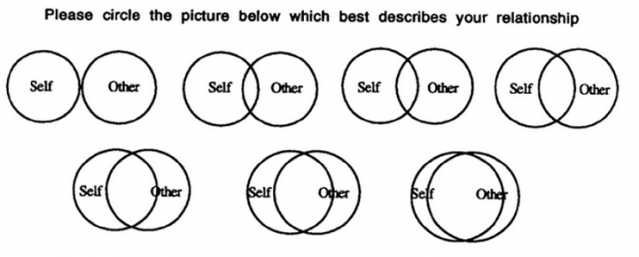
Relationships
Your Other Half?
How close is too close: Inclusion of other in self
Posted June 7, 2014
“It’s like you’re a part of me.” “My other half.” “Attached at the hip.” We have many colloquial ways of describing a romantic partner as being so emotionally close that it’s as though we include this other person in our own sense of self. As time goes on, this other person becomes a key component of our future, our days, and even our self-concept. We share resources, mannerisms, ideas, thoughts, dreams, problems, children, perspectives, and in-laws. However, for whatever emotional vulnerability this tendency supports, it also supports the success of committed relationships.
It turns out that this feeling is so critically important to relationships that psychologists also have a number of ways of examining interpersonal closeness (1). Reviews of intimacy research (2) describe self-disclosure as a key factor in the development and maintenance of closeness and intimacy. Indeed, it even predicts marital satisfaction (3), but even as new information to share dwindles over time, satisfaction and commitment are closely related to inclusion of other in self and self-disclosure (4) and also to relationship maintenance (5). Further, closeness has long been tied to intimacy (6). Some researchers suggest that intimacy is mainly a process of “an escalating reciprocity of self-disclosure in which each individual feels his or her innermost self validated, understood, and cared for by the other” (7). This understanding and care, and even the investment that people share in each other, is closely related to this feeling of "closeness." But how would you explain that this is what you want to a potential partner?
It turns out that you can ask in one question with a simple graphic and limited artistic talent. Aron, Aron, and Smollan (8) came up with a simple scale: The “Inclusion of Other in Self” (IOS) scale is a single-item pictorial measure for perceived interpersonal connectedness. Respondents choose a picture from an array as pictured below. Different degrees of overlap correspond to different degrees of sensed closeness.

Aron, A., Aron E. N., & Smollan, D. (1992). Inclusion of other in the self scale and the structure of interpersonal closeness.
So, Maslow’s incorporation of beloved people into the self (9) has been updated by Aron’s team to say that the partner can become as close as one is to the self--within Venn-able reason. This evolves with interdependence and development of a communal identity, which result in close relationships “… in which the individual feels a greater sense of union, proximity, and interconnection with a relationship partner”(10). In sum, couples who are most committed to their relationships, feel psychological attachment to the relationship, are more motivated to maintain the relationship, and have more positive affect toward their relationship are also those who have higher levels of disclosure and inclusion of other in self.
References
(1) A good example is the Relationship Closeness Inventory (RCI) by Berscheid, Snyder, and Omoto (1989), which breaks closeness down into time spent together, diversity of types of activities in which you participate together (e.g., watching a movie, cooking), and the degree of influence you think you have on the other’s decisions, activities, and plans (this includes the big things, like marriage, and the smaller things, like how you spend your free time). There are also many, many others.
(2) McAdams, 1988; Altman & Taylor, 1973; Derlega et al., 1993; Laurenceau, Rivera, Schaffer, & Pietromonaco, 2004.
(3) Hendrick, 1981
(4) Le & Agnew, 2003; Rusbult, 1980; Aron et al., 1992; Hendrick et al., 1988; Oswald & Clark, 2003; Sprecher & Hendrick, 2004
(5) Rusbult et al., 1986
(6) see Helgeson, Shaver, & Dyer, 1987
(7) Reis & Shaver, 1988 in Aron, Aron, & Smollan, 1992, p. 598
(8) 1992
(9) 1967, p. 103
(10) Aron et al., 2004 in Weidler & Clark, 2011, p.34

